Related Research Articles
Red Clydeside was the era of political radicalism in Glasgow, Scotland, and areas around the city, on the banks of the River Clyde, such as Clydebank, Greenock, Dumbarton and Paisley, from the 1910s until the early 1930s. Red Clydeside is a significant part of the history of the labour movement in Britain as a whole, and Scotland in particular.

The Women's Trade Union League (WTUL) (1903–1950) was a U.S. organization of both working class and more well-off women to support the efforts of women to organize labor unions and to eliminate sweatshop conditions. The WTUL played an important role in supporting the massive strikes in the first two decades of the twentieth century that established the International Ladies' Garment Workers' Union and Amalgamated Clothing Workers of America and in campaigning for women's suffrage among men and women workers.

A rent strike is a method of protest commonly employed against large landlords. In a rent strike, a group of tenants come together and agree to refuse to pay their rent en masse until a specific list of demands is met by the landlord. This can be a useful tactic of final resort for use against intransigent landlords, but carries the risk of eviction and lowered credit scores in some cases.

The 1918–19 British police strikes in the United Kingdom resulted in the British government putting before Parliament its proposals for a Police Act, which established the Police Federation of England and Wales as the representative body for the police. The Act barred police from belonging to a trade union or affiliating with any other trade union body. This Act, drafted and passed into law, was passed in response to the formation of the National Union of Police and Prison Officers (NUPPO). A successful police strike in 1918 and another strike in June 1919 led to the suppression of the union by the government. On 1 August 1919, the Police Act 1919 passed into law. Only token opposition from a minority of Labour Members of Parliament was voiced in Parliament.

Mary Barbour was a Scottish political activist, local councillor, bailie and magistrate. Barbour was closely associated with the Red Clydeside movement in the early 20th century and especially for her role as the main organiser of the women of Govan who took part in the rent strikes of 1915.
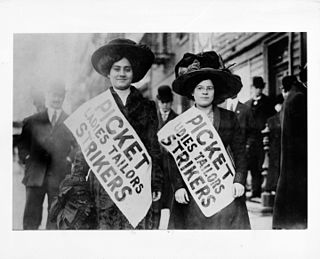
The New York shirtwaist strike of 1909, also known as the Uprising of the 20,000, was a labour strike primarily involving Jewish women working in New York shirtwaist factories. It was the largest strike by female American workers up to that date. Led by Clara Lemlich and the International Ladies' Garment Workers' Union, and supported by the National Women's Trade Union League of America (NWTUL), the strike began in November 1909.

Mary Reid Anderson was a Scottish suffragist and was a leading trades unionist. She was the general secretary of the Women's Trade Union League and was involved in the formation of the National Federation of Women Workers and National Anti-Sweating League.
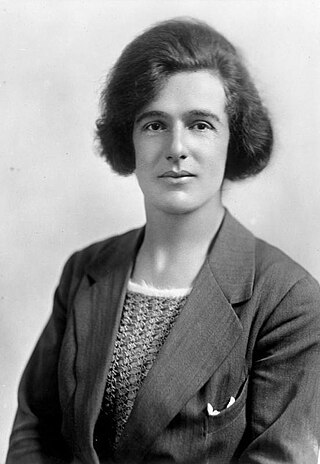
Jessie Stephen, MBE was a twentieth-century British suffragette, labour activist and local councillor. She grew up in Scotland and won a scholarship to train as a teacher. Family finances dictated otherwise, leading to her becoming a domestic worker at the age of 15. She became involved in national labour issues as a teenager, via organisations such as the Independent Labour Party and the Women's Social and Political Union. Stephen moved to London during World War I and in the 1920s she toured the United States and Canada, where she held meetings with the public including migrant English domestic workers.
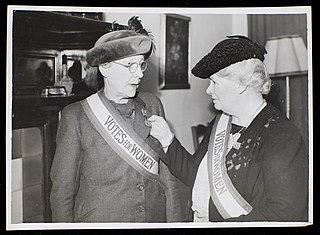
Helen Crawfurd was a Scottish suffragette, rent strike organiser, Communist activist and politician. Born in Glasgow, she was brought up there and in London.
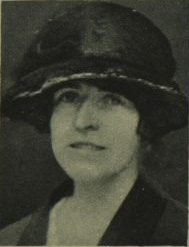
Agnes Johnston Dollan MBE, also known as Agnes, Lady Dollan, was a Scottish suffragette and political activist. She was a leading campaigner during the Glasgow Rent Strikes, and a founding organiser of the Women's Peace Crusade. In 1919, she was the first woman selected by the Labour party to stand for election to Glasgow Town Council, and later became Lady Provost of Glasgow.
Mary Laird was a founding member and first President of the Glasgow Women's Housing Association, a President of the Partick Branch of the Women's Labour League, associated with the Red Clydeside movement, and supported the Glasgow Rent Strikes of 1915 alongside Mary Barbour, Agnes Dollan, Mary Jeff and Helen Crawfurd. Laird went on to participate in wider social activism for women and children's rights.

The Increase of Rent and Mortgage Interest Act 1915 is an act of the Parliament of the United Kingdom which restricted increases in rent and the rate of mortgage interest during World War I. The act was in place on 25 November 1915 with its restrictions retrospectively in place from 4 August 1914.
Glasgow Women's Housing Association (GWHA) was established in Glasgow, Scotland, in mid-1914 by the Independent Labour Party Housing Committee launched by Andrew McBride in 1913 and the Women's Labour League in reaction to the increasing rent prices and overcrowding exacerbated by the advent of the First World War.

Frances Helen Melville, was a Scottish suffragist, advocate for higher education for women in Scotland, and one of the first women to matriculate at the University of Edinburgh in 1892. She was president of the British Federation of University Women from 1935 to 1942.
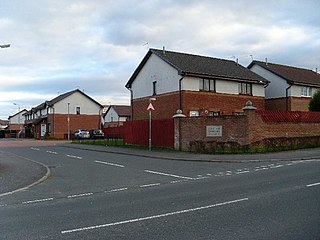
Jane Rae was a Scottish political activist, suffragist, councillor and justice of the peace. She was one of the activists involved in the 1911 all-out strike at the Singer Sewing Machine factory at Kilbowie in Clydebank. She was also active in the women's suffrage movement and in the Clydeside Rent Strike. She became Branch Secretary of the Clydebank branch of the Independent Labour Party, and served as a Labour councillor for Clydebank Town Council from 1922 to 1928. She is commemorated with a plaque in the gardens of Clydebank Town Hall.
Red Skirts on Clydeside, produced in 1984, is the fifth documentary film made by the Sheffield Film Cooperative. It follows the process of rediscovering women's histories, focusing on the Glasgow Rent Strikes of 1915 and four of the women involved: Helen Crawfurd, Agnes Dollan, Mary Barbour, Jean Fergusson.

Frances Mary McPhun (1880–1940) was a Scottish suffragette who served two months in Holloway prison, and had organised events and processions for women's suffrage in Edinburgh.

The Northern Men's Federation for Women's Suffrage was an organisation which was active in Scotland during the later part of the campaign for women's suffrage.
The Great Unrest, also known as the Great Labour Unrest, was a period of labour revolt between 1911 and 1914 in the United Kingdom. The agitation included the 1911 Liverpool general transport strike, the Tonypandy riots, the National coal strike of 1912 and the 1913 Dublin lockout. It was United Kingdom's most significant labour unrest since the Industrial Revolution but is not as widely remembered as the 1926 general strike. The period of unrest was labelled "great" not because of its scale, but due to the level of violence employed by both the state and labourers; including deaths of strikers at the hands of police and sabotage on the part of the workers.
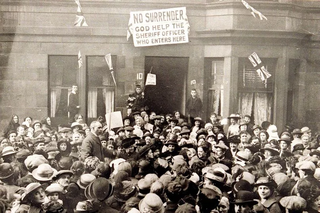
The 1915 Glasgow rent strikes were a series of tenant mobilizations by Glasgow, Scotland tenants opposing rent increases by landlords, who raised rents following a housing shortage.
References
- ↑ "THE HUMAN SUFFRAGE CAMPAIGN IN SCOTLAND". The Woman's Dreadnought. Vol. III-No. 16. WORKERS' SUFFRAGE FEDERATION. 15 July 1916.
- 1 2 "Remembering the Rent Strikes: guest post". Govan's Hidden Histories. 2016-05-15. Retrieved 2022-06-07.
- ↑ "The rent strikes - Domestic impact of World War One - society and culture - Higher History Revision". BBC Bitesize. Retrieved 2022-06-07.